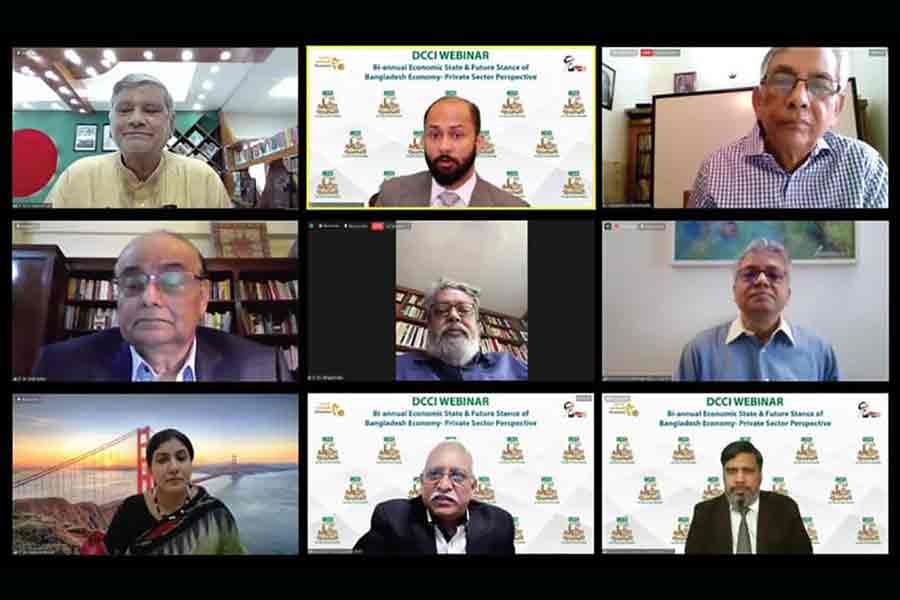Bangladesh’s economy has suffered a setback with 2.26 million jobs lost due to the COVID-19 pandemic, which has battered the world for over one a half years.
Dhaka Chamber of Commerce & Industry (DCCI) President Rizwan Rahman came up with the statement while presenting the keynote paper at a webinar on Saturday, according to a statement published by DCCI on its website.
The DCCI organised the webinar on ‘Bi-annual economic state and future stance of Bangladesh economy: private sector perspective’.
In the keynote, Rizwan Rahman said that the overall economy overall fell into a crisis due to the rapid spread of COVID-19 cases across the world.
“GDP value reduced to US$ 364 billion against the target of US$ 374 billion. The poverty rate rose by 9.0 per cent to 29.5 per cent and 30 per cent. 2.26 million jobs have been lost already,” he informed.
He said in terms of macroeconomic perspective over the last six months, the economy is being conducted more or less in the right direction despite manifold COVID-led challenges.
“Both public and private sectors have to work hand in hand towards the road to recovery to achieve the game-changing economic transformation of Bangladesh targeted in 2026 and 2041.”
In order to boost internal revenue generation, Rizwan Rahman suggested full automation of tax, vat, customs assessment, return and credit.
Regarding monetary policy, he said relaxed terms and conditions of repayment and collateral will help increase credit demand from the private sector.
Referring to achieving the target of 25 per cent private investment to GDP ratio in the current fiscal, the DCCI president recommended improvement in country competitiveness, cluster development of backward linkage industry, expanding ADR system and capital market-led long-term financing.
For the survival of the CMSMEs, he suggested the introduction of collateral-free cash flow-based loans, comprehensive policy framework, reduction of bureaucratic complexities and at least three years moratorium period.
He also urged the importance of faster approval of loan process for the CMSMEs, most likely of seven days from the time of application.
The DCCI president sought a special focus on investment in the governance of the health system and allocation in research and development of public health, Bio-technology, epidemic disease control.
Planning Minister M A Mannan joined the webinar as the chief guest while Professor Dr Mohammed Farashuddin, former governor of Bangladesh Bank, was the guest of honour.
The planning minister said the private sector is in the driving seat of stimulating the economy and the sector will take Bangladesh to a new destination.
“For policy reforms, tax reforms or tariff structure reforms, the government will continue its attachment with the private sector for framing out a better policy regime,” the minister added.
Mohammed Farashuddin stressed increasing the existing tax-GDP ratio, which is only 10 per cent whereas, he said, it is 18 per cent in Nepal
Pointing out Vietnam’s present position in terms of RMG export, the former governor of Bangladesh Bank suggested following the successful model of Vietnam, Nepal and Sri Lanka.
He sought policy reforms and an efficient credit flow mechanism so that cottage, micro and small entrepreneurs can be benefitted largely.
Mohammed Farashuddin also called for a buy-back system for better FDI attraction and transformation of the agriculture sector in producing goods and services for the domestic market.
Dr Zaidi Sattar, chairman of Policy Research Institute (PRI) of Bangladesh, advocated for a sustainable trade policy having equal treatment, especially for the non-garment sector, citing Vietnam’s example.
He said, “Vietnam’s export is dependent on foreign manufacturers and their export basket is diversified.”
Director-General of Bangladesh Institute of Development Studies (BIDS) Dr Binayak Sen, Director of IBA of Dhaka University Prof Mohammad Abdul Momen, Country Economist of UNDP Bangladesh Dr Nazneen Ahmed also addressed the webinar.


